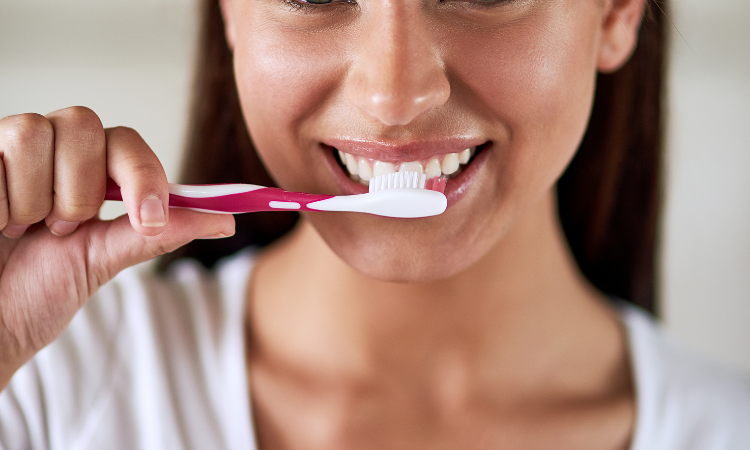A bright, confident smile can light up a room and leave a lasting impression. But plaque can quietly damage your teeth and gums if you’re not careful. Understanding how plaque forms, the harm it can cause, and how to prevent it can help you protect your smile forever. Let’s break it down.

What Is Plaque?
Plaque is a sticky colorless film that constantly forms on your teeth. It’s made up of bacteria, food particles, and saliva. While plaque forms naturally, it becomes a problem if you don’t remove it every day. The bacteria in plaque produce acids when you eat foods high in sugar or carbs. These acids attack your tooth enamel. This can lead to cavities and other dental issues if you don’t treat it.
The tricky thing about plaque is that it’s often invisible. You might not even notice it until it starts causing problems. That’s why sticking to a good oral hygiene routine is so important for keeping your smile healthy.
How Does Plaque Form?
Plaque forms when bacteria in your mouth mix with food particles and saliva. Foods high in sugar and starch are the biggest culprits. The bacteria in your mouth feed on them. The bacteria produce acids as they break down the sugars and starches. These acids can start attacking your teeth within minutes of eating.
Here are some factors that contribute to plaque buildup:
- Sugary foods: Candies, sodas, and desserts can increase plaque.
- Starchy snacks: Chips, bread, and pasta also contribute to plaque.
- Poor oral hygiene: If you don’t brush and floss regularly, plaque builds up quickly.
If plaque isn’t removed, it can harden into tartar. Tartar is a rough calcified substance that forms above and below your gumline. Tartar is much harder to remove and needs a professional dental cleaning.
The Damage Plaque Can Cause
Plaque doesn’t just sit on your teeth. It can cause serious problems for your oral health. From cavities to gum disease and even tooth loss, the damage can be significant. Let’s take a closer look at these risks.
Cavities
Cavities, also called dental caries, are one of the most common results of plaque buildup. When plaque acids eat away at your tooth enamel, they create small holes or cavities. If left untreated, these cavities can grow larger and deeper, affecting the inner layers of your tooth. This can lead to pain, infection, and even tooth loss.
The good news? Catching cavities early can prevent more serious dental work. Regular dental checkups help spot cavities before they become a bigger problem, allowing for simple treatments like fillings.
Gum Disease
Plaque can also damage your gums. When plaque builds up along the gumline, it can irritate and inflame your gums, leading to gingivitis, the first stage of gum disease. Symptoms include red, swollen gums that bleed easily when you brush or floss.
If gingivitis isn’t treated, it can progress to a more severe form of gum disease. Periodontitis can destroy the bone and tissue that support your teeth, leading to tooth loss. Gum disease is also linked to serious health issues like heart disease and diabetes.
Tooth Loss
Advanced gum disease can cause your gums to pull away from your teeth. This stage forms pockets that easily become infected. Over time, this can damage the bone and tissue that hold your teeth in place. Eventually, your teeth may become loose and fall out.
Tooth loss doesn’t just affect your smile, it can also make it harder to chew and speak properly. Replacing missing teeth can be expensive and time-consuming, so preventing tooth loss through good oral hygiene is the best approach.
How to Prevent Plaque Buildup
The good news is that plaque is preventable. Here’s how you can keep it under control:
- Brush your teeth twice a day: Use fluoride toothpaste to remove plaque and protect your enamel.
- Floss daily: Flossing cleans between your teeth, where plaque likes to hide.
- Eat a balanced diet: Limit sugary and starchy foods, and choose tooth-friendly options like fruits, veggies, and dairy.
- Visit your dentist regularly: Professional cleanings remove plaque and tartar that brushing and flossing can’t.
Protect Your Smile from Plaque
Plaque might be sneaky, but it doesn’t have to ruin your smile. By understanding how plaque forms and the damage it can cause, you can take steps to protect your teeth and gums. Stick to a good oral hygiene routine, eat a healthy diet, and visit your dentist regularly to keep your smile bright and healthy.
Your smile is worth protecting, so don’t let plaque take it away. Visit Coastal General Dentistry for a dental exam. Call us at 757-216-9914 or request an appointment online.

